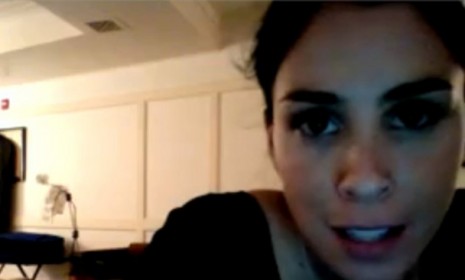Tyler Clementi: The fallout
Ellen DeGeneres is urging hope, lawmakers are attacking the internet, and bridges are getting a new look, among other reactions to the recent rash of gay teen suicides

A free daily email with the biggest news stories of the day – and the best features from TheWeek.com
You are now subscribed
Your newsletter sign-up was successful
Tyler Clementi, the Rutgers student who killed himself Sept. 22, may be the most publicized of the five — or more — gay or (perceived-as-gay) youths who took their lives last month, apparently in response to anti-gay bullying. But together, the suicides have captured national and international attention, and shocked people into soul-searching conversations about cyber-bullying, homophobia, crime, and social networking. Here are five key talking points from the fallout:
1. Ellen, Dan Savage, others say "It gets better"
Billy Lucas, a 15-year-old who killed himself Sept. 9, is the inspiration for sex columnist Dan Savage's "It Gets Better" YouTube series — in which gay men and women describe their travails growing up gay and make the case that life gets better as you get older. Coincidentally, the posting of his first video dovetailed with the Clementi tragedy, helping it go viral. Since then, participants (including straight celebrities such as Sarah Silverman) have uploaded more than 200 videos. Gay talk-show-host Ellen DeGeneres released her own "heart-felt" video message in which she calls gay teen suicide an "epidemic," and echoes Savage's theme: "Things will get easier, people's minds will change, and you should be alive to see it."
The Week
Escape your echo chamber. Get the facts behind the news, plus analysis from multiple perspectives.

Sign up for The Week's Free Newsletters
From our morning news briefing to a weekly Good News Newsletter, get the best of The Week delivered directly to your inbox.
From our morning news briefing to a weekly Good News Newsletter, get the best of The Week delivered directly to your inbox.
2. The George Washington Bridge might get a concrete wall
Clementi, who leapt to his death from the George Washington Bridge, isn't the only recent high-profile suicide to do so — reality TV chef Joseph Cerniglia, of "Kitchen Nightmares," chose the same site a week earlier. Under discussion: A concrete barrier that would make leaping from the bridge, which links New Jersey to Manhattan, more difficult, a proposal whose wisdom is supported by research, according to John Draper of the National Suicide Prevention Hot Line. "Many people are under the impression that if you just put up a barrier [would-be suicides] will find another way to kill themselves," says Draper. "It's a myth" — they won't.
3. "Who is to blame?" becomes a heated topic
Blame for Clementi's death has been heaped on his roommate, Dharum Ravi, and Ravi's friend, Molly Wei. And rightly so, says Cahir O'Doherty in Irish Central: Their role in the tragedy — streaming live video of Clementi's sexual encounter with another male on the Web — was an act of "premeditated cruelty." Yes, says Jonathan Capehart in The Washington Post, but the problem goes deeper: The fact that Clementi and the other suicidal gay kids apparently "felt there was no alternative, no resource or person they could turn to for help is an indictment of our society." And don't forget everyone who bullied Clementi in high school and before, says Dan Savage in The Portland Mercury. Ravi's and Wei's "cruelty" may have simply been the last straw.
A free daily email with the biggest news stories of the day – and the best features from TheWeek.com
4. Social networking comes in for moral scrutiny
New Jersey lawmakers and some Rutgers faculty members are pinning blame on the Internet for killing our privacy. They should, says the New York Daily News in an editorial. Before the rise in the kind of poisonous "antisocial networking" that claimed Clementi's life, Ravi and Wei "would have been limited to gossiping...." Nevertheless, they still had choices, says Rabbi Andy Bachman in The Jewish Daily Forward. If you use technology without considering the moral implications, it becomes "a tool for evil" — a way to create "bizarre 'reality TV'" out of your roommate's gay hookup, all for "a click and a laugh."
5. Final question: Are Ravi and Wei "evil"?
"The webcam is not responsible" for the "premeditated" evil perpetrated by Ravi and Wei, says Susan Jacoby in The Washington Post. "Yes, evil." The Russian Poet "Joseph Brodsky once wrote, "evil doesn't necessarily announce itself by walking in the door and saying, 'Hi, I'm evil.'" And in this case, evil manifested itself in "two privileged young people whose bright, white smiles" covered a "moral vacuum." You have to feel bad for their parents, says Leonard Stern in The Ottawa Citizen. They apparently nurtured Ravi and Wei's intellectual growth without thinking much about their moral development. Let's hold off on the "Internet hate-fest" until we know all the facts, says Lee Lusardi Connor in NJ.com. We don't know Ravi and Wei's motives, or their hearts, only that "hating on them" is easier than looking at our own shortcomings.
-
 Political cartoons for February 12
Political cartoons for February 12Cartoons Thursday's political cartoons include a Pam Bondi performance, Ghislaine Maxwell on tour, and ICE detention facilities
-
 Arcadia: Tom Stoppard’s ‘masterpiece’ makes a ‘triumphant’ return
Arcadia: Tom Stoppard’s ‘masterpiece’ makes a ‘triumphant’ returnThe Week Recommends Carrie Cracknell’s revival at the Old Vic ‘grips like a thriller’
-
 My Father’s Shadow: a ‘magically nimble’ film
My Father’s Shadow: a ‘magically nimble’ filmThe Week Recommends Akinola Davies Jr’s touching and ‘tender’ tale of two brothers in 1990s Nigeria